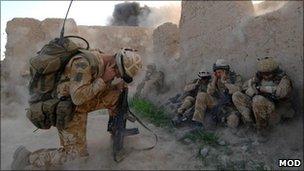Wikileaks memos reveal partial view of UK's Afghan role
- Published

Two years ago, there were not enough British forces to do the job being asked of them.
As the latest batch of leaked US diplomatic cables reveals strong criticism of the UK's military efforts in Afghanistan, the BBC correspondent there, Paul Wood, explains the context surrounding the harsh views.
The documents, released by Wikileaks and published in the Guardian newspaper, external, focus on the UK's attempts in the country between 2007 to 2009.
"The British are not up to the task of securing Helmand,", external - that was the judgement of both US diplomats and the Afghan president, Hamid Karzai, as revealed in one of the American diplomatic cables.
British performance
But those were remarks made in 2008 when some 10,000 UK troops were trying to control Helmand - a job which is now being done by another 20,000 US marines.
Two years ago, there were simply not enough British forces to do the job being asked of them.
In another very blunt judgement on British performance, this time from a cable written in January last year, Gulab Mangal, the governor of Helmand tells US vice-president Joe Biden that British security in the troubled district of Sangin did not even extend to the main bazaar. , external
The US marines have taken over Sangin now - and they are running into many of the same problems as their British counterparts.
One battalion of US Marines had around seven per cent killed or injured in one 30-day period.
And President Karzai is quoted in the documents published on the Guardian website, external as saying that security had worsened in Helmand since the British troops arrived in 2006.
"Helmand was safe for girls to go to school," he said, "Now 4,000 (sic) British soldiers are in Helmand and the people are not safe."
The British government would not agree but the private judgement of some British officers is remarkably similar, acknowledging that the effect of going to Helmand was to increase the violence there.
One colonel told me he thought the province would never be pacified - it was just too lawless, with too much smuggling, drugs money and general crime, in addition to the insurgency.
Is this then a rerun of Basra?
The British army endured many humiliations there at the hands of Shia militias - all in the name of the Atlantic alliance - only then to be criticised by the US military for suffering what was, essentially, a defeat.
But Afghanistan is not Iraq.
UK Special Forces in particular have played a vital role in the campaign - one praised by US commanders - and Helmand will be bloody for whoever is sent there, the British, the American or the Afghan forces.
- Published1 December 2010